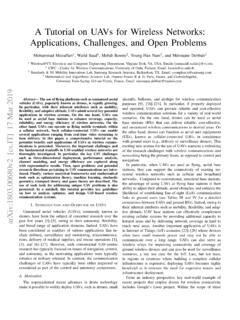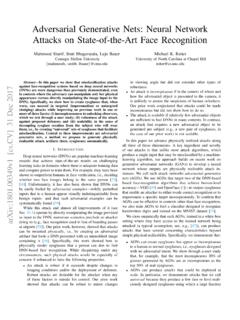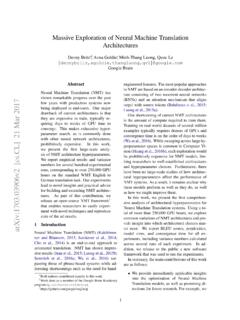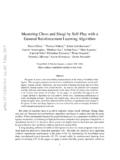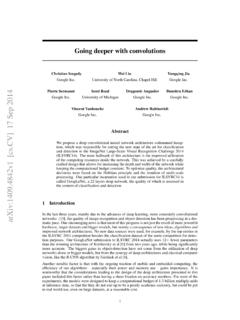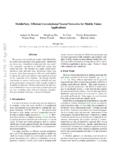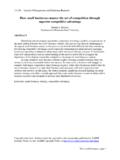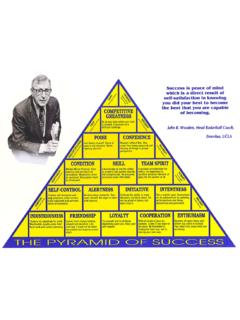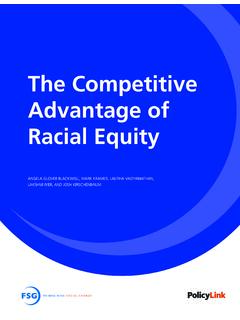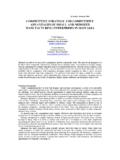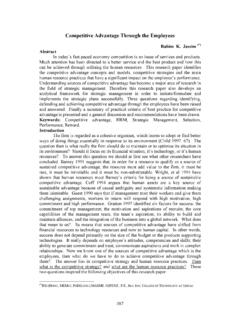Transcription of Abstract - arXiv
1 Multi-Agent Actor-Critic for Mixed Cooperative-Competitive Environments Ryan Lowe Yi Wu Aviv Tamar McGill University UC Berkeley UC Berkeley OpenAI. [ ] 16 Jan 2018. Jean Harb Pieter Abbeel Igor Mordatch McGill University UC Berkeley OpenAI. OpenAI OpenAI. Abstract We explore deep reinforcement learning methods for multi-agent domains. We begin by analyzing the difficulty of traditional algorithms in the multi-agent case: Q-learning is challenged by an inherent non-stationarity of the environment, while policy gradient suffers from a variance that increases as the number of agents grows.
2 We then present an adaptation of actor-critic methods that considers action policies of other agents and is able to successfully learn policies that require complex multi- agent coordination. Additionally, we introduce a training regimen utilizing an ensemble of policies for each agent that leads to more robust multi-agent policies. We show the strength of our approach compared to existing methods in cooperative as well as competitive scenarios, where agent populations are able to discover various physical and informational coordination strategies.
3 1 Introduction Reinforcement learning (RL) has recently been applied to solve challenging problems, from game playing [23, 28] to robotics [18]. In industrial applications, RL is emerging as a practical component in large scale systems such as data center cooling [1]. Most of the successes of RL have been in single agent domains, where modelling or predicting the behaviour of other actors in the environment is largely unnecessary. However, there are a number of important applications that involve interaction between multiple agents, where emergent behavior and complexity arise from agents co-evolving together.
4 For example, multi-robot control [20], the discovery of communication and language [29, 8, 24], multiplayer games [27], and the analysis of social dilemmas [17] all operate in a multi-agent domain. Related problems, such as variants of hierarchical reinforcement learning [6] can also be seen as a multi-agent system, with multiple levels of hierarchy being equivalent to multiple agents. Additionally, multi-agent self-play has recently been shown to be a useful training paradigm [28, 30]. Successfully scaling RL.
5 To environments with multiple agents is crucial to building artificially intelligent systems that can productively interact with humans and each other. Unfortunately, traditional reinforcement learning approaches such as Q-Learning or policy gradient are poorly suited to multi-agent environments. One issue is that each agent's policy is changing as training progresses, and the environment becomes non-stationary from the perspective of any individual agent (in a way that is not explainable by changes in the agent's own policy).
6 This presents learning stability challenges and prevents the straightforward use of past experience replay, which is . Equal contribution. crucial for stabilizing deep Q-learning. Policy gradient methods, on the other hand, usually exhibit very high variance when coordination of multiple agents is required. Alternatively, one can use model- based policy optimization which can learn optimal policies via back-propagation, but this requires a (differentiable) model of the world dynamics and assumptions about the interactions between agents.
7 Applying these methods to competitive environments is also challenging from an optimization perspective, as evidenced by the notorious instability of adversarial training methods [11]. In this work, we propose a general-purpose multi-agent learning algorithm that: (1) leads to learned policies that only use local information ( their own observations) at execution time, (2) does not assume a differentiable model of the environment dynamics or any particular structure on the communication method between agents, and (3) is applicable not only to cooperative interaction but to competitive or mixed interaction involving both physical and communicative behavior.
8 The ability to act in mixed cooperative-competitive environments may be critical for intelligent agents;. while competitive training provides a natural curriculum for learning [30], agents must also exhibit cooperative behavior ( with humans) at execution time. We adopt the framework of centralized training with decentralized execution, allowing the policies to use extra information to ease training, so long as this information is not used at test time. It is unnatural to do this with Q-learning without making additional assumptions about the structure of the environment, as the Q function generally cannot contain different information at training and test time.
9 Thus, we propose a simple extension of actor-critic policy gradient methods where the critic is augmented with extra information about the policies of other agents, while the actor only has access to local information. After training is completed, only the local actors are used at execution phase, acting in a decentralized manner and equally applicable in cooperative and competitive settings. Since the centralized critic function explicitly uses the decision-making policies of other agents, we additionally show that agents can learn approximate models of other agents online and effectively use them in their own policy learning procedure.
10 We also introduce a method to improve the stability of multi-agent policies by training agents with an ensemble of policies, thus requiring robust interaction with a variety of collaborator and competitor policies. We empirically show the success of our approach compared to existing methods in cooperative as well as competitive scenarios, where agent populations are able to discover complex physical and communicative coordination strategies. 2 Related Work The simplest approach to learning in multi-agent settings is to use independently learning agents.
![arXiv:0706.3639v1 [cs.AI] 25 Jun 2007](/cache/preview/4/1/3/9/3/1/4/b/thumb-4139314b93ef86b7b4c2d05ebcc88e46.jpg)
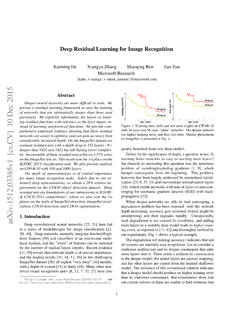
![arXiv:1301.3781v3 [cs.CL] 7 Sep 2013](/cache/preview/4/d/5/0/4/3/4/0/thumb-4d504340120163c0bdf3f4678d8d217f.jpg)
![@google.com arXiv:1609.03499v2 [cs.SD] 19 Sep 2016](/cache/preview/c/3/4/9/4/6/9/b/thumb-c349469b499107d21e221f2ac908f8b2.jpg)
